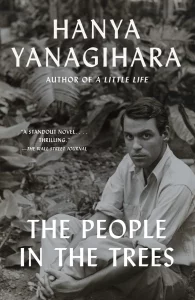a review of “The People In the Tree” by Hanya Yanagihara

Hanya Yanagihara’s *The People in the Trees* is a gripping and unsettling novel that explores the consequences of scientific discovery. The story follows Dr. Norton Perina, a Nobel Prize-winning scientist, who uncovers a hidden tribe in Micronesia that has discovered how to live much longer by eating the flesh of a rare turtle. However, this discovery brings trouble not only for the tribe but also for Perina himself, who later faces accusations of criminal behavior.
Yanagihara’s descriptions of the Micronesian island are rich and detailed, making the setting feel alive. The expedition Perina embarks on is not just an adventure, but also a look at the impact of Western interference on indigenous cultures.
The novel is presented as Perina’s memoir, edited by his colleague Dr. Ronald Kubodera, which creates an interesting narrative style. It leaves readers questioning whether Perina is a misunderstood hero or someone who has done terrible things. The story raises deep questions about cultural differences, ethics, and the price of scientific progress.
While some may find the book challenging, especially due to its slow pace and dark themes, it is a thought-provoking and well-written debut. Yanagihara proves herself a skilled storyteller who knows how to keep readers engaged, even when dealing with uncomfortable topics.
For those who enjoy complex stories that make them think, *The People in the Trees* is a powerful and haunting read. It asks tough questions about human nature, morality, and the cost of discovery.

